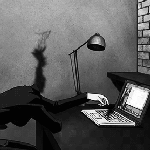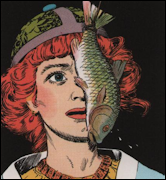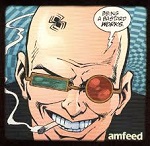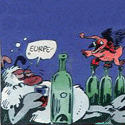|
In 1034 Harald Hardråde (Harald the Hard Ruler) went to Byzantine and joined the varangian guard for seven years. During that time empress Zoë Porphyrogenita developed a crush on him and asked for a lock of his hair, Harald answered that he would give Zoe that if she gave him a lock of her "belly hair".
|
|
|
|
|

|
| # ? May 13, 2024 22:58 |
|
Kevin DuBrow posted:I don't have my copy on hand but I'm pretty sure that the Conservatives favored blue. Outside of America Conservatives generally do favor blue. Blame TV for that. https://www.youtube.com/watch?v=lgz3p4cEXZU
|
|
|
|
Lord Lambeth posted:Outside of America Conservatives generally do favor blue. Blame TV for that. This is not completely accurate. In Europe, the economic left favours red, even the strong conservative elements in the economic left. The economic right favours blue, even the liberal factors in the economic right.
|
|
|
|
https://www.youtube.com/watch?v=fUIUyKLo3bA This is "The Weavers", a short silent film made in 1905 by the Brothers Manaki. The Manakis came from Avdella, a small village in the Ottoman Empire that today is part of the Greek region of West Macedonia. The movie is said to be the first movie made in the Balkans by people living there and depicts the Manakis' aunts and grandmother in Avdella. But that's not the interesting part. See the old woman, which is filmed weaving beginning at the 12 seconds mark? That's their grandmother Despina, who at the time being filmed was said to be 114 years old. If this is true (and I've found nothing that would cast doubt on that), then you're looking at footage of a person born in the 18th century. e: in 1791, when Despina was supposedly born, the Holy Roman Empire still existed (and would continue to do so for 15 years), the Americas were mostly ruled by Spain, Vermont is admitted as the 14th state, the colony of New South Wales is a whopping three years old and the French royal family tries in vain to flee the country which will nonetheless remain a monarchy for another year or so. System Metternich has a new favorite as of 21:25 on Nov 20, 2016 |
|
|
|
System Metternich posted:[old people] This sent me on a wiki walk that included: "Casquette girl posted:They were conspicuous by reason of their virtue. Normally women were supplied to the colonists by raking the streets of Paris for undesirables, or by emptying the houses of correction. The casquette girls, however, were recruited from church charitable institutions, usually orphanages and convents, and, although poor, were practically guaranteed to be virgins. "Pamlico Sound posted:In March 1524, Italian Explorer Giovanni da Verrazzano mistook the sound for the Pacific Ocean because of its wide expanse and separation from the Atlantic Ocean by the Outer Banks barrier islands. "Snorri Thorfinnsson posted:Snorri Thorfinnsson (Old Norse and Icelandic: Snorri Þorfinnsson or Snorri Karlsefnisson) probably born between 1004 and 1013, and died c. 1090) was the son of explorers Þorfinnur Karlsefni and Guðríður Þorbjarnardóttir. He is considered to be the first white child to be born in the Americas, apart from Greenland.
|
|
|
|
Platystemon posted:Revoke the corporate charter. Split up their assets. That lets them off too easy. Turn them into a non profit and force them to donate any income above basic operating costs to local and federal aid programs aimed at helping the community and people affected by their crimes. Yeah, I know it would never work for any number of reasons but it's a nice thought.
|
|
|
|
The Shaggs In 1968 a father made his 3 daughters create a band, since his mother had predicted that they would be a success from a palm reading she had done. They had minimal musical training, but they created a wholly original sound. Described as "hauntingly bad", the album has been said to be one of Frank Zappa and Kurt Cobain's favorites. Zappa is claimed to have called them "better than the Beatles", and the album has become somewhat popular recently. https://en.wikipedia.org/wiki/The_Shaggs
|
|
|
|
The North Tower posted:The Shaggs How could you post this without the album? Oh god this is terrible https://www.youtube.com/watch?v=jQqK1CjE9bA
|
|
|
|
The North Tower posted:The Shaggs Holy hell this is so bad I can't stop listening to it.
|
|
|
|
Government Handjob posted:Holy hell this is so bad I can't stop listening to it. http://www.octopuspie.com/2009-11-22/342-as-bad-as-it-looks/    
Kennel has a new favorite as of 16:42 on Nov 21, 2016 |
|
|
|
Rutibex posted:How could you post this without the album? Oh god this is terrible I listened to this in one sitting. It was certainly something. But this went through a whole recording process. Was this the best takes gobbled together? Didn't anybody at any point said, that isn't actually music, it's just mostly random sounds? I mean I'm kind of glad this got made, I just can't imagine how. Imagine the faces of local radio djs when they have listened to this for the first time. I bet their father must have included some kind cheaply made brochure in which this band is hailed as the next superstar.
|
|
|
|
The North Tower posted:The Shaggs My university roommate had a copy of this, and we spent way too much time listening to it while baked.
|
|
|
|
As far as music goes, I think the chitlin' circuit was a pretty fascinating phenomenon. Obviously it was the product of African-American artists making the best of a bad situation in the midst of the Jim Crow era, and sure it was run by a bunch of gangsters, but it's a really interesting example of marginalised people creating an entire music and performance industry within the margin they'd been unjustly forced into, built around this network of nightclubs and theatres and largely independent of mainstream pop music. While Duke Ellington would pay his band $40 a night playing at Carnegie Hall, guys like Walter Barnes and King Kolax could keep an orchestra on the road for most of the year playing the chitlin' circuit and afford to pay their musicians sometimes up to $100 a night. Same thing with the so-called "gospel highway". You'd have guys like the Dixie Hummingbirds, the Soul Stirrers, the Sensational Nightingales, the Five Blind Boys of Mississippi and so on (most of whom could rock a lot harder than just about any contemporary rock and roller other than Little Richard, Jerry Lee Lewis, Bo Diddley and maybe Larry Williams) on the road, and it would be really carefully planned out. They'd play in storefront churches in big cities then go out and time their tours to align with the harvests being brought in (i.e. hitting the tobacco states in late summer) because that's when prospective audiences, mostly farm labourers and sharecroppers, would have some money to go and see them. Those are just two examples, of course. Whenever you look at any "Top 50 Worst / Dumbest Album Covers of All Time" list on the Internet, the lion's share of them are sure to be Christian albums from the 1960s and 1970s. They're fun to look at, but much more than that, they hint at this forgotten "shadow" music industry which existed independently of the mainstream, built on this network of everything from tent meetings to the early megachurches. If you're interested in learning more about the chitlin' circuit I readily recommend The Chitlin' Circuit and the Road to Rock & Roll by Preston Lauterbach.
|
|
|
|
Wheat Loaf posted:They're fun to look at, but much more than that, they hint at this forgotten "shadow" music industry which existed independently of the mainstream, built on this network of everything from tent meetings to the early megachurches. Any more information on this? Anyways, here's some interesting, contrasting views on Lincoln, first a modern one , the second one from 1909. http://www.theatlantic.com/magazine/archive/2005/10/lincolns-great-depression/304247/ (Only copy/pasting bits and pieces of the first article, the full thing is worth reading.) quote:...By 1835 Lincoln had lived for four years in New Salem, a village in central Illinois that backed up to a bluff over the Sangamon River. Twenty-six years old, he had made many friends there. That summer an epidemic of what doctors called "bilious fever"—typhoid, probably—spread through the area. Among those severely afflicted were Lincoln's friends the Rutledges. One of New Salem's founding families, they had run a tavern and boardinghouse where Lincoln stayed and took meals when he first arrived. He became friendly with Ann Rutledge, a bright, pretty young woman with golden hair and large blue eyes. In August of 1835 she took sick. Visiting her at her family's farm, Lincoln seemed deeply distressed, which made people wonder whether the two had a romantic, and not just a friendly, bond. After Lincoln's death such speculation would froth over into a messy controversy—one that cannot be, and need not be, resolved. Regardless of how he felt about Rutledge while she was alive, her sickness and death drew Lincoln to his emotional edge. Around the time of her burial a rainstorm, accompanied by unseasonable cold, shoved him over. "As to the condition of Lincoln's Mind after the death of Miss R.," Henry McHenry, a farmer in the area, recalled, "after that Event he seemed quite changed, he seemed Retired, & loved Solitude, he seemed wraped in profound thought, indifferent, to transpiring Events, had but Little to say, but would take his gun and wander off in the woods by him self, away from the association of even those he most esteemed, this gloom seemed to deepen for some time, so as to give anxiety to his friends in regard to his Mind." It's worth considering if someone with Lincoln's history of emotional problems could be elected President today. In 1909 Leo Tolstoy had this to say about Lincoln. http://storyoftheweek.loa.org/2010/02/tolstoi-holds-lincoln-worlds-greatest.html quote:“Of all the great national heroes and statesmen of history Lincoln is the only real giant. Alexander, Frederick the Great, Caesar, Napoleon, Gladstone and even Washington stand in greatness of character, in depth of feeling and in a certain moral power far behind Lincoln. Lincoln was a man of whom a nation has a right to be proud; he was a Christ in miniature, a saint of humanity, whose name will live thousands of years in the legends of future generations. We are still too near to his greatness, and so can hardly appreciate his divine power; but after a few centuries more our posterity will find him considerably bigger than we do. His genius is still too strong and too powerful for the common understanding, just as the sun is too hot when its light beams directly on us. It's good and even necessary to have the true image of Lincoln- or any "Great Man/Woman" - of history ; that of a flawed, human figure who had human virtues and vices. To whitewash their humanity is to betray history. At the same time I think there's a place for the idealized myths: It's much more inspiring to think about the Washington who refused a kingship, the Lincoln who "lived with love as the foundation of his life", or the FDR who helped Little Orphan Annie (Alright, kinda reaching with that last one) then it is to think about Washington owning slaves, Lincoln abolishing habeas corpus , or FDR interning Japanese-Americans. Sometimes we need those myths to serve as inspiration, and I'm ok with that. 
|
|
|
|
Rutibex posted:How could you post this without the album? Oh god this is terrible You guys realize that the lead singer for The Shaggs released a brand new album in 2013 and then went on tour with Neutral Milk Hotel last year, right?
|
|
|
|
Nckdictator posted:
So, then you disagree with the tearing down of Columbus then? Columbus as the pure Exploration figurehead?
|
|
|
|
Johnny Aztec posted:So, then you disagree with the tearing down of Columbus then? Not at all. The myth of the "brave man who sailed into the unknown and showed those dumb Europeans that the world was not flat and found the New World (Native Americans? What Native Americans?)" needed to be challenged and it's a good thing that the truth has been recognized that Columbus was a butcher. However, if the first man or woman to set foot on Mars or Proxima Centauri finds the idea or story of "A brave man who sailed into the unknown and found a New World" inspiring or something that drives them then it might be fine to let them have their myth.
|
|
|
|
Tolstoy posted:Being a Mussulman he was naturally opposed to all ideas of progress and education. Savage. Nckdictator posted:However, if the first man or woman to set foot on Mars or Proxima Centauri finds the idea or story of "A brave man who sailed into the unknown and found a New World" inspiring or something that drives them then it might be fine to let them have their myth. That man’s name? Leif Erikson.
|
|
|
|
Nckdictator posted:Any more information on this? I would like to think so. It I don't know where you'd find it. That part of my post was really a bit of an assumption. If you are interested in the history of gospel music you should read The Gospel Sound: Good News In Bad Times by Anthony Heilbut, which really is the definitive text on the subject.
|
|
|
|
Platystemon posted:That man’s name? Didn't discover poo poo either.
|
|
|
|
But he was a white guy!
|
|
|
|
Nobody really believed Columbus was going to sail over the edge of the world because most people (most learned people, anyway) knew the world was round in 1492. What they were worried about was that he would run out of provisions before he arrived in India, which is where he wanted to go, and if the Americas hadn't been in the way, that would have been the case. Fun fact about the conquistadors: Francisco Pizarro never learned to write his own name, so had a stencil made with his signature which he filled in when he had to sign important documents. Another fun fact (which I at least think is true): when Pizarro's enemies came to kill him, he fought them off with his sword and was only killed when they threw one of their friends onto his blade and stabbed him through the neck while he was trying to pull it out.
|
|
|
|
Mr. Belpit posted:Didn't discover poo poo either. Yeah he did. Was he the first person to discover it? No. But he still discovered it. He had no prior knowledge of North America. He was indeed sailing into the unknown (in a less foolhardy way than Chris C.). Bravery is subjective; I can’t speak to that. Wheat Loaf posted:Nobody really believed Columbus was going to sail over the edge of the world because most people (most learned people, anyway) knew the world was round in 1492. What they were worried about was that he would run out of provisions before he arrived in India, which is where he wanted to go, and if the Americas hadn't been in the way, that would have been the case.rd and was only killed when they threw one of their friends onto his blade and stabbed him through the neck while he was trying to pull it out. Columbus was one of the luckiest motherfuckers ever to live. Not only was he saved by the existence of a continent he has no reason to believe existed, but you know that trope where the hero (white guy, time traveller, or both) awes the primitives with his knowledge of future eclipses? Columbus actually did that. In Columbus fashion, this fortune was only necessary because he was being a total dick: quote:At first, the natives were hospitable to Columbus, but his sailors stole from and cheated the natives [also straight‐up murdered a few]. Finally, after six months the natives stopped their food supply to Columbus and his men. Platystemon has a new favorite as of 11:59 on Nov 22, 2016 |
|
|
|
tacodaemon posted:You guys realize that the lead singer for The Shaggs released a brand new album in 2013 and then went on tour with Neutral Milk Hotel last year, right? What. The. gently caress. Is this real life?
|
|
|
|
I would say that somebody who arrived to a place unknown to anybody in his part of the world, to find people not yet contacted by anybody on his continent, who in turn did not know about the new arrival's land, was indeed a discoverer, of land and of its people, for his own people. Whether or not some Scandinavians arrived to a different part of the same new world earlier is quite insignificant, because their discovery had virtually no impact on anything, the latter explorers were not aware of it, it was just a forgotten historical episode. steinrokkan has a new favorite as of 19:04 on Nov 22, 2016 |
|
|
|
https://en.wikipedia.org/wiki/Gustave_Whitehead Speaking of firsts, there's a guy who maybe flew his own plane a couple years before the Wright Brothers. Big maybe there. He claims to have flown over Long Island Sound in his plane in 1902. It's an interesting bit of controversy, at least.
|
|
|
|
I'm gonna use this opportunity to rehash in hopes of discovery the Roman Dodecahedron. https://en.wikipedia.org/wiki/Roman_dodecahedron Hundreds of these things have been found in modernity from all over the (formerly Roman) world, and it's likely many more exist or did exist before being re-purposed. Problem is: While they make an interesting decoration now, nobody has a definitive idea of what they used to be for. One would think it makes a fine standard of measurement in an age without the metric system, except for that they frequently came in non-standard sizes. It really bothers me to not understand a particular engineering choice. I'll go to lengths to dig up technical diagrams of my desktop stapler so I can find out why the engineer designed a particular lever like they did. I must know why these exist. GolfHole has a new favorite as of 20:13 on Nov 22, 2016 |
|
|
|
My guess is "cool doodad."
|
|
|
|
Jaramin posted:My guess is "cool doodad." Maybe. But consider that the casting effort and metal that went into making these could have much more easily been purposed into those swinging pendulum ball things that people in the 90's used to have on their desk. And those are much cooler.
|
|
|
|
I guess y'all don't remember when it was discovered that these things were ancient 3D scanning devices: http://www.romansystemsengineering.com/our_product.html
|
|
|
steinrokkan posted:I would say that somebody who arrived to a place unknown to anybody in his part of the world, to find people not yet contacted by anybody on his continent, who in turn did not know about the new arrival's land, was indeed a discoverer, of land and of its people, for his own people. Oz posted:The Vikings, their brutality aside, had their moments of brilliance. At one point, they were such great shipbuilders, that Leif Ericson and his crew sailed all the way to America. Some people say that he probably went as down south as the New York harbor. Here's where the brilliance comes in- they took a look and went back. Wheat Loaf posted:
There are six signatures by Shakespeare that are regarded as authentic, all of them spell his name differently. Fun fact about Shakespeare's tomb: On his tombstone it is inscribed "Good friend, for Jesus' sake forebear, To dig the dust enclosed hear, Blessed be the man that spares these stones, And cursed be he that moves my bones". It is believed that it was written because digging up and eating dead famous guys was the fad back then.
|
|
|
|
|
Still my favourite thread on the forum that roman dodecahedron one, I think. It's certainly up there.
|
|
|
|
I was gonna say ancient D&D
|
|
|
|
Alhazred posted:There are six signatures by Shakespeare that are regarded as authentic, all of them spell his name differently. Shakespeare was pretty infamously bad at spelling, which is probably why he ended up inventing so many words. It's estimated that Shakespeare used about 18,000 words in his plays and poems, while the Bible at the time used only around 8,000.
|
|
|
|
Alhazred posted:There are six signatures by Shakespeare that are regarded as authentic, all of them spell his name differently. This was pretty common in my experience... Nobody spelled anything consistently. Even within the same text, you'll find the same writer using several variations on the same words. I don't know that you can really say anyone was a bad speller before the advent of standardized spelling.
|
|
|
|
Dictionaries didn't really become a "Thing" until the 1600s, there wasn't much standardization on how to spell things and people just agreed "eh, if it sounds right".
|
|
|
|
Wheat Loaf posted:Shakespeare was pretty infamously bad at spelling, which is probably why he ended up inventing so many words. Not only that, but Shakespeare invented over 1700 new words. Shakespeare invented the word 'zany'. http://shakespeare-online.com/biography/wordsinvented.html
|
|
|
|
Typical enough, there isn't one exact spelling of the author's name of the first known English alphabetical dictionary. He was also enough of a visionary to include instructions on alphabetical lookup.
|
|
|
|
Spellings may change, but some things are forever. I have a gentil cok, Crowyt me day; He doth me rysyn erly, My matyins for to say. I have a gentil cok, Comyn he is of gret; His comb is of reed corel, His tayil is of get. I have a gentyl cook, Comyn he is of kynde; His comb is of red corel, His tayl is of inde. His legges ben of asor, So gentil and so smale; His spores arn of sylver qwyt, Into the wortewale. His eynyn arn of cristal, Lokyn al in aumbry; And every nyght he perchit hym In myn ladyis chaumbyr. (from Select Secular Lyrics of the Fourteenth and Fifteenth Centuries, University of Rochester Library)
|
|
|
|

|
| # ? May 13, 2024 22:58 |
|
Another fun fact: Dr Samuel Johnson's vendetta against the people of Scotland was such that in the original version of his dictionary, he defined "oats" as "a grain, which in England is generally given to horses, but in Scotland supports the people". The comeback from Scottish writers was approximately, "This is why England has the most beautiful horses, but Scotland has the most beautiful women."
|
|
|










































